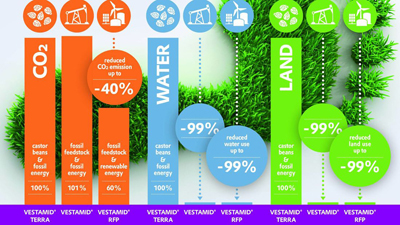Evonik improves carbon footprint of polyamide 12 Vestamid
Essen, Germany – Evonik has started offering its customers a further type of sustainable polyamide 12 molding compounds. Selected commercial VESTAMID® products can now be manufactured using sustainable energy at Evonik’s Marl Chemical Park in Germany. In September 2021, the TÜV Rheinland certified the life cycle assessments of the compounds. These will be labelled with the suffix RFP for “reduced footprint”.
Evonik has been producing polyamide 12 at the Marl Chemical Park in North Rhine-Westphalia for more than 50 years and uses the electricity and steam produced there by its own state-of-the-art and efficient combined heat and power plants. By using biomethane generated from waste in these plants, emissions of the climate gas carbon dioxide for VESTAMID® RFP are reduced by an average of 40 percent, while water consumption and land use remain almost the same.
Since 2009, Evonik has also marketed VESTAMID® Terra molding compounds, which are based on monomers obtained from castor oil. In comparison, VESTAMID® RFP shows a significantly improved eco-balance: the carbon footprint is reduced by 40 percent, while water consumption and land use are more than 99 percent lower.
Evonik develops customized high-performance polymers for demanding applications and is a global leader in the production of PA 12, which is in high demand in attractive markets in the form of VESTAMID® granules. The PA 12 powder VESTOSINT® is used to coat metals in consumer goods, dishwasher baskets and components for the automotive industry. Evonik has also years of experience developing special plastic powders that enable industrial production of high-tech components using 3D printing.

